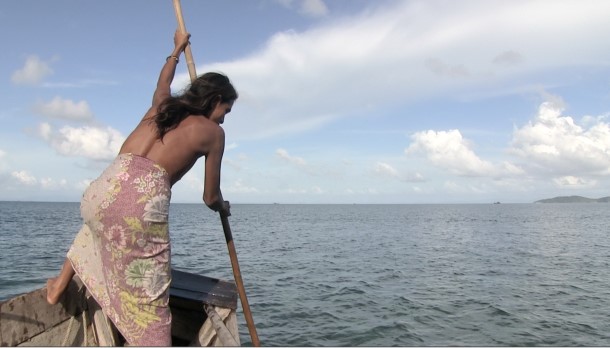RANGOON — The Moken, one of Southeast Asia’s last remaining hunter-gatherer populations, face increasing threats to their livelihood and access to services, a leading rights group warned on Thursday, calling for an immediate end to discrimination against the seafaring minority.
In a report titled “Stateless at Sea: The Moken of Burma and Thailand,” Human Rights Watch detailed mechanisms in both countries that entrench marginalization of the Moken community, including faulty citizenship criteria and abuse by Burma’s armed forces.
Numbering about 3,000 people spread across some 800 islands in the Andaman Sea, the Moken are known as one of Asia’s dwindling “Sea Gypsy” tribes. Most Moken spend much of their time fishing and foraging from small wooden boats, though about 800 are believed to have taken to more permanent settlement in Thailand.
While the Moken have sustained their nomadic lifestyle for centuries, tightening immigration laws and maritime conservation efforts have left them restricted to remote areas with little access to livelihoods, basic services and legal protection, Human Rights Watch said.
The Moken, also known as the Salon, are among Burma’s 135 officially recognized ethnic groups as per a 1982 Citizenship Law, though many lack the documents to prove their nationality. According to Human Rights Watch, the Burmese government has been “inconsistent” in granting national ID cards to the remote community.
Moreover, the Burma Navy, which patrols the areas where the Moken reside, have been known to exploit their statelessness through fear and extortion. The report cites several examples of fishermen abandoning their boats and spoils at the first sign of approaching authorities, fearful that officers will “point their guns at us.”
In centuries past, the Moken moved freely along the Andaman coast, weaving in and out of both Thai and Burmese waters. Those who were born on Thai islands also lack citizenship and face tremendous bureaucratic obstacles to obtaining legal status.
Thailand amended its nationality law in 2008 to allow stateless persons to register and seek citizenship, but required that applicants present a birth certificate, prove 10 years of residence within the Kingdom or verify blood relation to a Thai national. Many do not have birth certificates or proof of residence, as they are a nomadic people.
Like other stateless peoples, the Moken lack access to fundamental services such as healthcare and education. According to Human Rights Watch, most Moken children do not attend school at all, and medical treatment is typically not sought unless a condition becomes critical.
Development has offered little relief for the ill-fated outsiders. Many who intermittently reside on islands, where in some cases they have been returning to otherwise uninhabited lands for years, have no legal claim and now face eviction as developers move in, the report said. Unwanted and ill-fitting in inland communities, the Moken are finding themselves with few places left to go.
In other areas, such as the Surin Islands Marine National Park off the coast of Thailand, new regulations geared toward nature conservation have had the adverse effect of limiting livelihoods. According to Human Rights Watch, new laws within the park prohibit chopping wood needed to repair boats and homes. While the Moken are still allowed to catch fish for their own consumption, they cannot collect and trade sea products.
“Ironically, the Thai government’s creation of national parks in the Andaman Sea, ostensibly aimed at protecting the environment the Moken have helped to preserve, is seriously affecting the Moken lifestyle,” the report read, continuing with the story of Jui, once a forager who now begs for a living. Jui told researchers that about 16 years ago, officials came around and told locals they could no longer fish around the Surin islands.
“They set so many rules and restrictions on our ways of life,” he told Human Rights Watch.
As a result, many Moken have abandoned their traditional livelihoods to seek other work. Unfortunately, their maritime prowess and informal legal status has made them ideal recruits for dangerous and often illegal jobs, such as free diving and dynamite fishing, Human Rights Watch said.
Urging the governments of both Thailand and Burma to “immediately end discrimination and other rights abuses against the Moken,” HRW Asia Director Brad Adams stressed the urgency of addressing statelessness.
“Far from the idyllic image that tourism promotes of the Moken people, these sea nomads face increasing restrictions and attacks at sea, and systematic discrimination on land,” Adams said. “By effectively denying them citizenship, the Thai and Burmese governments make the Moken easy targets for exploitation and other threats to their very existence.”

















